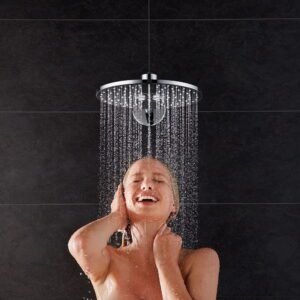
Overview
Don’t get confused between the hair damage and hair loss !
If you’ve ever noticed a residue on your hands after washing them, you’ve encountered the effects of hard water. Now, consider what that might be doing to your hair—hint: it’s not good. Hard water contains high levels of minerals like calcium and magnesium, which can create a film on the hair, making it hard for moisture to penetrate. Consequently, your hair becomes dry, brittle, and prone to breakage. Fortunately, there are steps you can take to combat these effects. Keep reading to discover these hair-saving solutions.
While hard water itself isn’t harmful, it can have negative consequences for both hair and skin. A 2016 study involving 15 females revealed that exposure to hard water over a 30-day period resulted in damaged hair, with decreased thickness and a rough texture observed in samples washed with hard water. Other common hair symptoms associated with washing in hard water include breakage, thinning, tangling, dry scalp, dullness, brassiness, or a greenish tint, and frizziness.
If you’re seeking to revive hair damaged by hard water, these strategies can work wonders:
Install a Water Softener Shower Head: Soft water, with lower mineral concentration than hard water, is gentler on hair. While installing a whole-house water softener is optimal, it can be costly. An affordable alternative is a water softener shower head, equipped with carbon-filled cartridges to remove minerals before water contacts your hair.
Use a Clarifying Shampoo: To eliminate mineral buildup and restore hair vitality, incorporate a clarifying shampoo into your routine at least once a week. Opt for a shampoo specifically designed to address hard water issues, rather than merely removing styling product residue. Here are the best shampoos for hard water, tested and reviewed by Cosmopolitan for 2024:https://www.cosmopolitan.com/style-beauty/beauty/g38888558/best-hard-water-shampoos/
Apply a Hair Mask: Replenish moisture and luster by treating your locks to a nourishing hair mask at least twice weekly. Ensure thorough application from the scalp to the tips, leaving the mask on for a minimum of 5 minutes. Additionally, consider using a leave-in conditioner with a low pH to seal cuticles and retain moisture.
Try a Citrus and Vinegar Rinse: Combat hard water damage at the scalp with a natural solution comprising water, vinegar, and citrus juice. Apple cider vinegar, in particular, helps balance hair pH and offers essential vitamins like B and C.
If you’re limited to showering with hard water, you can still mitigate damage with these hair-washing techniques:
Focus on the Scalp: Prioritize scalp care, using sulfate-free shampoos between clarifying washes to remove excess oil and debris without stripping the hair.
Rinse Properly: To minimize hair loss concerns, rinse hair following its natural growth direction, from crown to forehead.
Thorough Rinsing: Ensure hair is completely rinsed before applying conditioner.
Cold Water Finish: Conclude your shower or bath with cold water, if tolerable, to seal cuticles and promote hair health.
Saying all that, hard water can exacerbate Seborrheic Dermatitis and Psoriasis that may contribute to hair loss, but hard water inself directly does not causes hair loss.
